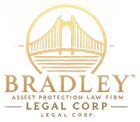Understanding Irrevocable Trusts vs. The Bridge Trust: Which Asset Protection Strategy is Right for You?
In today’s complex financial landscape, asset protection has become a significant concern for high-net-worth individuals and families. When searching for effective and legal asset protection strategies, two common options often discussed are traditional irrevocable trusts and The Bridge Trust®, a proven solution that has been around for nearly 30 years. Understanding the differences between these two options can help you make informed decisions that best suit your unique needs.
A Real-Life Scenario: The Need for Asset Protection
Consider the story of Jane and Tom, a married couple who have diligently worked to accumulate their wealth. As they navigate their financial future and explore ways to protect their assets from potential creditors and lawsuits, they stumble upon two popular options: irrevocable trusts and The Bridge Trust®.
The Common Misconception: Irrevocable Trusts
The prevalent belief is that establishing an irrevocable trust is the simplest and most effective way to shield assets. The idea is straightforward—by transferring assets into an irrevocable trust, they are no longer owned by the grantor. However, Jane and Tom soon discovered that this approach carries significant drawbacks.
Pitfalls of a Traditional Irrevocable Trust
1. No Ownership and Control
With an irrevocable trust, once Jane and Tom transfer assets, they permanently relinquish control over them. They will no longer have the right to access, alter, or sell these assets, which can make them feel vulnerable.
• Example: If Jane decided to transfer their cherished family vacation home into an irrevocable trust, she could no longer make decisions regarding the property without consulting the trust beneficiaries. This lack of control could create unwanted complications, especially as family dynamics change.
2. Tax Complications
Establishing an irrevocable trust involves complex tax implications. Every year, Jane and Tom would face gift tax considerations and additional income tax filings because the trust is treated as a separate entity. This translates into filing extra tax returns, complicating their finances further.
3. Forced Asset Giveaways
One of the most significant issues with traditional irrevocable trusts is that many individuals, like Jane and Tom, feel unprepared to entirely relinquish their hard-earned assets just for the sake of protection.
Limitations of Domestic Irrevocable Trusts
While domestic irrevocable trusts can offer estate planning benefits, they often fail to provide reliable asset protection in the face of creditor claims or lawsuits. Courts have repeatedly pierced these trusts under certain circumstances. Below are notable cases that highlight the vulnerabilities of domestic irrevocable trusts:
1. Battley v. Mortensen (2011)
• Case Summary: In this Alaska case, a domestic asset protection trust was pierced in a bankruptcy proceeding. The court found that the trust was created in anticipation of creditor claims, invalidating its protections.
• Key Takeaway: Courts closely scrutinize the timing and intent behind trust creation, especially when financial trouble is foreseeable.
2. In re Huber (2013)
• Case Summary: A Washington bankruptcy court invalidated an irrevocable trust, ruling that it was established with the intent to hinder, delay, or defraud creditors.
• Key Takeaway: Even in states with favorable asset protection laws, fraudulent intent can render a trust ineffective.
3. Kilker v. Stillman (2012)
• Case Summary: A California court ruled against an irrevocable trust being used as an alter ego for the grantor, exposing its assets to creditors.
• Key Takeaway: Commingling assets or exercising excessive control over a trust undermines its protections.
4. Toni 1 Trust v. Wacker (2018)
• Case Summary: The Alaska Supreme Court ruled that a trust failed to meet the requirements of the Uniform Fraudulent Transfer Act, exposing its assets to creditor claims.
• Key Takeaway: Compliance with state-specific laws is essential for a trust to offer legitimate protection.
5. Dahl v. Dahl (2015)
• Case Summary: In a Utah divorce case, the court determined that an irrevocable trust’s assets were part of the marital estate because the grantor retained too much control.
• Key Takeaway: Retaining control over trust assets can make them vulnerable, especially in divorce proceedings.
Enter The Bridge Trust®: A Flexible and Modern Alternative
After weighing the drawbacks associated with irrevocable trusts, Jane and Tom discovered The Bridge Trust®, an innovative and proven asset protection strategy that combines flexibility with robust protection.
What Sets The Bridge Trust Apart?
1. Retained Control and Accessibility: With The Bridge Trust, Jane and Tom can remain the beneficiaries, providing them with direct control and access to their assets until a legal threat arises. This flexibility means they won’t have to completely give up their rights to their wealth.
Example: If Tom’s business encounters a potential lawsuit, The Bridge Trust could be activated, allowing the assets to transition into an offshore model for enhanced protection without relinquishing their control beforehand.
2. Simplified Tax Management: Unlike traditional irrevocable trusts, The Bridge Trust features a “grantor trust” tax designation, eliminating the need for additional tax returns each year. This streamlined approach simplifies their financial responsibilities and reduces complexities.
3. Enhanced Creditor Protection: Due to its offshore capabilities, The Bridge Trust makes it significantly more challenging for creditors to reach their assets. This means that Jane and Tom can be assured that their wealth is well-protected.
Learn More About Trust Options
If you’re interested in understanding more about the different types of trusts, I have previously written an article comparing revocable and irrevocable trusts. Gaining this knowledge will further inform your decision-making process.
[Click here to read the article on Revocable vs. Irrevocable Trusts]
https://btblegal.com/blog-articles/f/irrevocable-vs-revocable-trusts-whats-the-difference
Conclusion: Making Informed Choices for Asset Protection
As Jane and Tom navigated their options, it became evident that while traditional irrevocable trusts offer certain protections, they also come with significant drawbacks that could compromise their financial autonomy. In contrast, The Bridge Trust emerged as a comprehensive and flexible solution with a proven track record, empowering them to protect their assets while maintaining control.
For individuals and couples like Jane and Tom, understanding the differences between these asset protection strategies is crucial for making informed decisions. Protecting your wealth is not just about following conventional wisdom—it’s about selecting a strategy that aligns with your personal goals and circumstances.
If you find yourself in a similar situation and are considering your options for asset protection, consult with experienced legal advisors who can help create a customized strategy tailored to your unique needs. Reach out to our law firm today for a personalized consultation and let’s work together to secure your financial future. Your assets deserve the best protection available!
👉 Learn more:
• Visit our blog for a deeper dive into asset protection strategies.
• Check out my #1 best-selling book “Over Exposed” on Amazon for real-world case studies and more insights.
Protect what you’ve built—before it’s too late.
For a FREE legal consultation call our asset protection law firm and speak with an asset protection lawyer at (888) 773-9399.
By: Brian T. Bradley, Esq.




